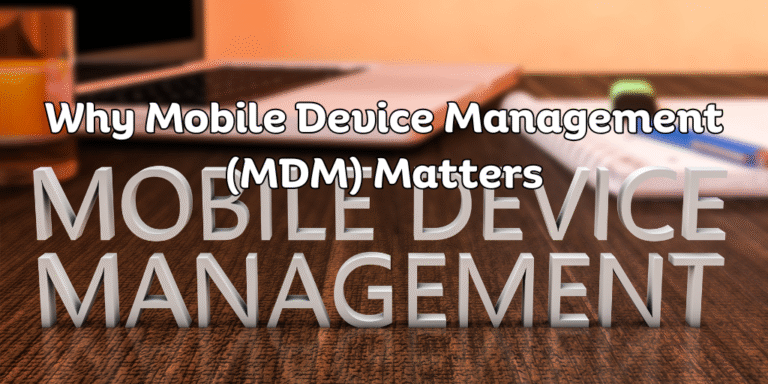In today’s world, it’s important to protect your online presence. Cyber threats are constantly changing, so having the right protection is essential. Antivirus and anti-malware software are key tools to help keep your devices and data safe. But how do these tools work, and why are they so important? In this article, we will explain everything you need to know about antivirus and anti-malware protection—how they are different, how they work, and why they are necessary.
What Is Antivirus and Anti-Malware Protection?
What Is Antivirus Software?
Antivirus software is made to find, block, and remove harmful programs like viruses, worms, and trojans from your devices. It was created to protect against viruses. But as online threats grew, antivirus software evolved to protect against many types of harmful software.
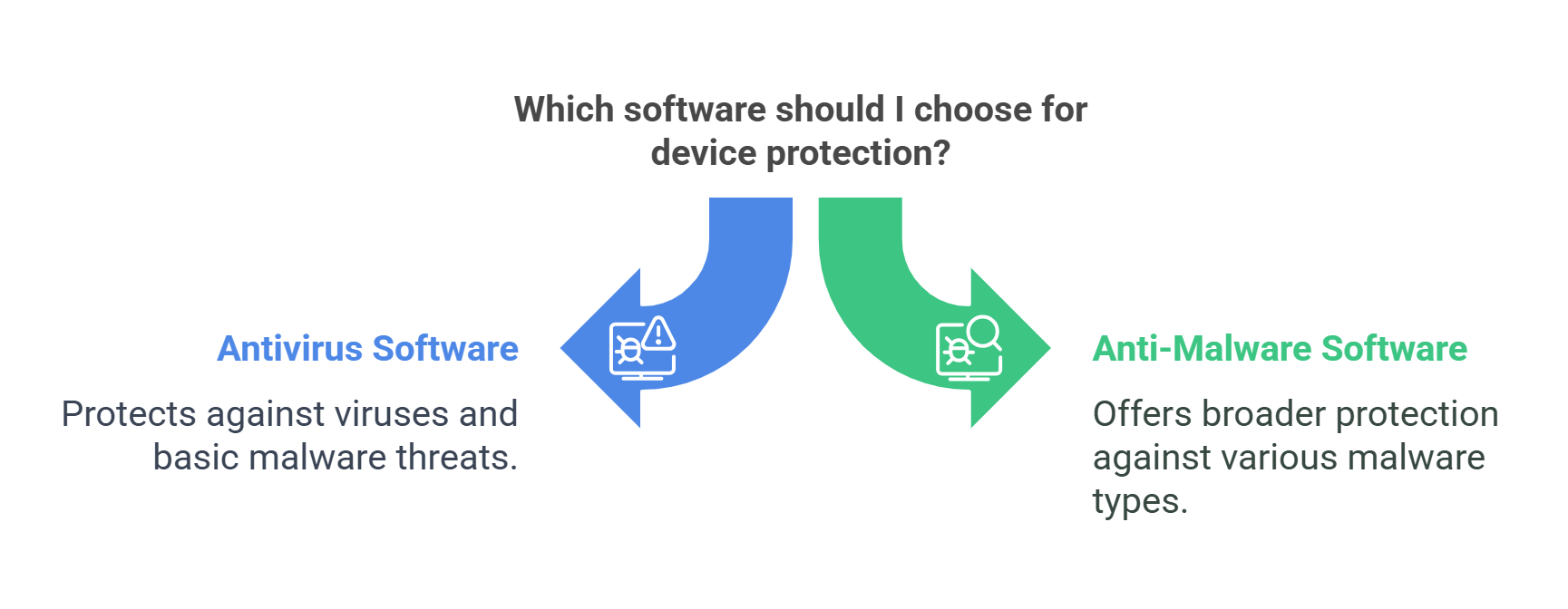
What Is Anti-Malware Software?
Anti-malware software works to protect against a wider range of malicious programs, or “malware.” While antivirus software mainly focuses on viruses, anti-malware software protects against threats like spyware, ransomware, adware, rootkits, and others. Malware can steal data, damage systems, or take control of your device, making anti-malware protection crucial for full security.
The Difference Between Antivirus and Anti-Malware
Both antivirus and anti-malware programs protect your devices, but there are key differences:
- Scope of Protection: Antivirus software mainly protects against viruses. Anti-malware software protects against a wider range of threats, including spyware, ransomware, and other harmful programs.
- Detection Methods: Antivirus software usually uses signature-based detection, comparing files to known virus patterns. Anti-malware software may use additional techniques, like behavior-based methods, to detect new or unknown threats.
- Scanning: Antivirus software typically runs scheduled scans and offers real-time protection. Anti-malware software may provide deeper, more thorough scans, focusing on unusual file behavior and suspicious activities.
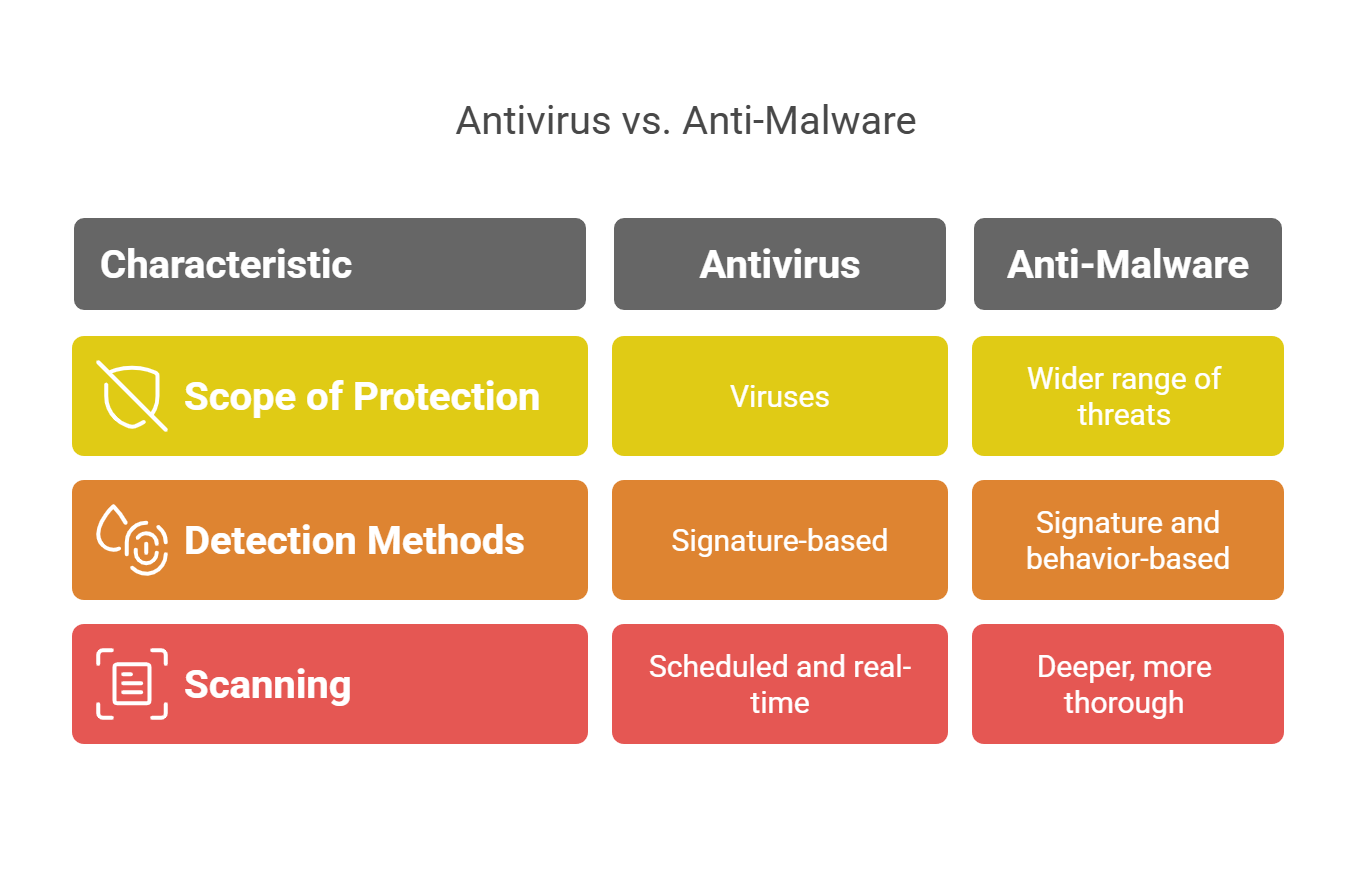
Key Takeaway: For complete protection, it is best to use both antivirus and anti-malware software. This combination helps protect your devices from many types of cyber threats.
Why You Need Antivirus and Anti-Malware Protection
Protect Your Data
The main reason to use antivirus and anti-malware software is to protect your personal information. Malware can steal your credit card numbers, passwords, and other sensitive data. Cybercriminals use malware to break into systems and steal valuable information.
- Identity Theft: Stolen data can be used to pretend to be you and commit fraud.
- Data Loss: Some malware, like ransomware, can lock or delete your files, making them impossible to recover.
Protect Your Devices and Network
Both viruses and malware can affect not only your computer but also your phone and other connected devices. Antivirus and anti-malware tools provide layers of protection to help keep all your devices safe.
- Performance: Malware can slow down your devices by using resources or corrupting files.
- Network Protection: Cybercriminals can exploit weaknesses in your network to spread malware. Antivirus and anti-malware software help stop these attacks from affecting other devices on your network.
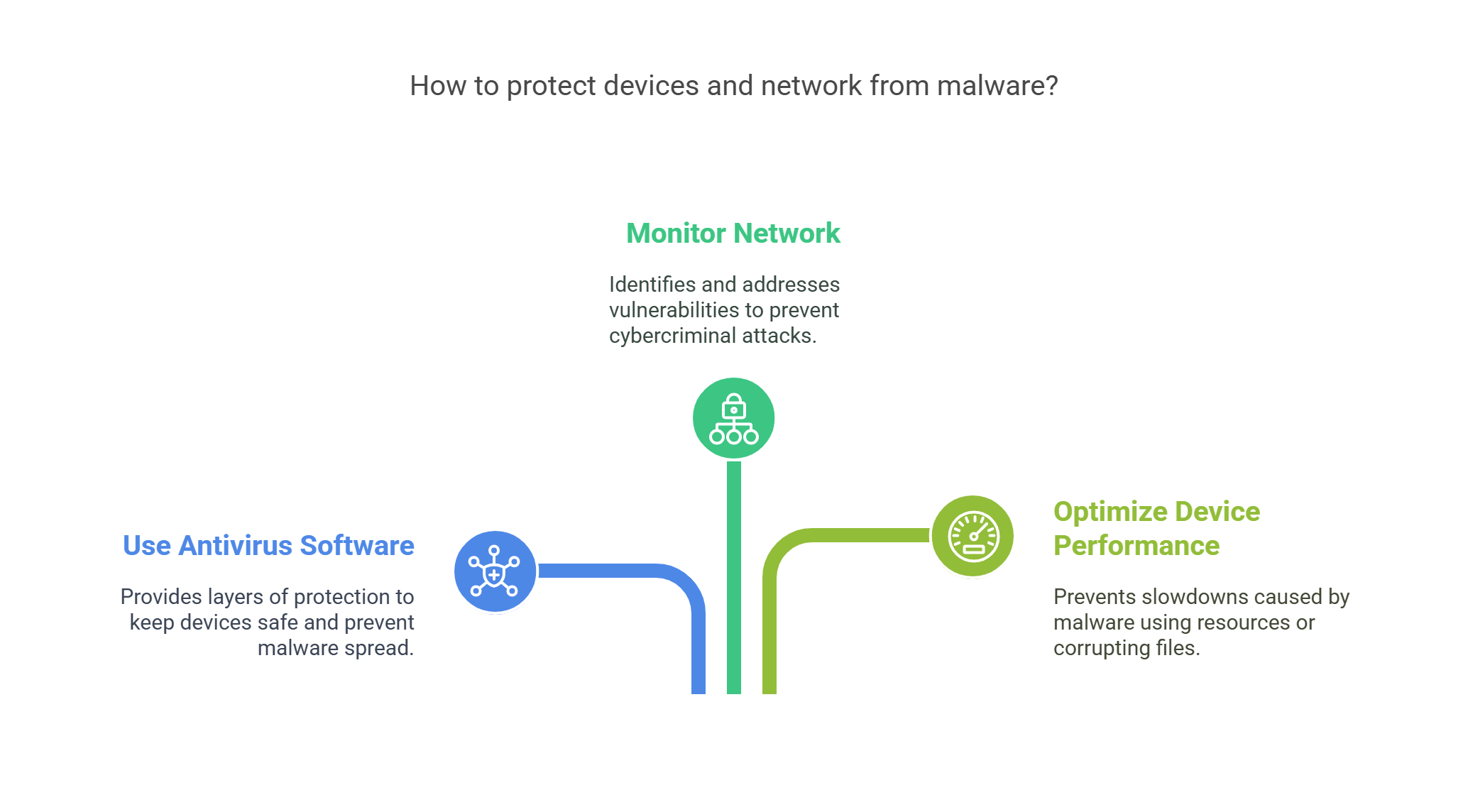
Fight Ransomware and Other Advanced Threats
Modern malware is more complex than ever. For example, ransomware locks your files and demands payment to release them. Antivirus and anti-malware software can detect and stop these attacks early, reducing the potential damage.
Avoid Financial Loss
Malware can cause financial problems. It can steal money directly or compromise your online banking. Antivirus and anti-malware software help prevent these attacks and protect your finances.
How Antivirus and Anti-Malware Software Work
Signature-Based Detection
Signature-based detection is the most common method used by antivirus software. It compares files to a database of known virus signatures. If a match is found, the software will alert you and either remove or quarantine the file.
Heuristic Analysis
Heuristic analysis looks at how files behave rather than relying only on known signatures. It checks for suspicious actions, like trying to access sensitive data or contacting unknown servers. This method helps antivirus software detect new threats that haven’t been seen before.

Real-Time Protection
Real-time protection scans files as they are opened or downloaded. If the software detects a threat, it blocks the file before it can cause harm. This ongoing protection helps keep your system safe from immediate threats.
Behavioral Analysis
Behavioral analysis works with heuristic analysis to monitor how files behave over time. If a file starts behaving like malware, it is flagged for removal or quarantine.
Best Practices for Using Antivirus and Anti-Malware Protection
Keep Software Updated
Cyber threats are always changing, so your protection software needs regular updates. Developers release updates to address new threats. Always make sure automatic updates are turned on so your software is always up-to-date.
Run Regular Scans
While real-time protection helps stop immediate threats, it’s important to run full-system scans regularly. Set up scheduled scans to check for malware or viruses that might have been missed during real-time scans.
Be Cautious with Downloads and Links
Even the best antivirus and anti-malware software can’t protect you from mistakes. Avoid downloading files or clicking on links from unknown or suspicious sources. Be careful when browsing the web, and don’t fall for phishing emails or fake pop-ups.
Use a Layered Approach
No single security measure is enough. To maximize your protection, use a combination of antivirus software, anti-malware programs, firewalls, and VPNs. A layered security approach provides the best defense against cyber threats.
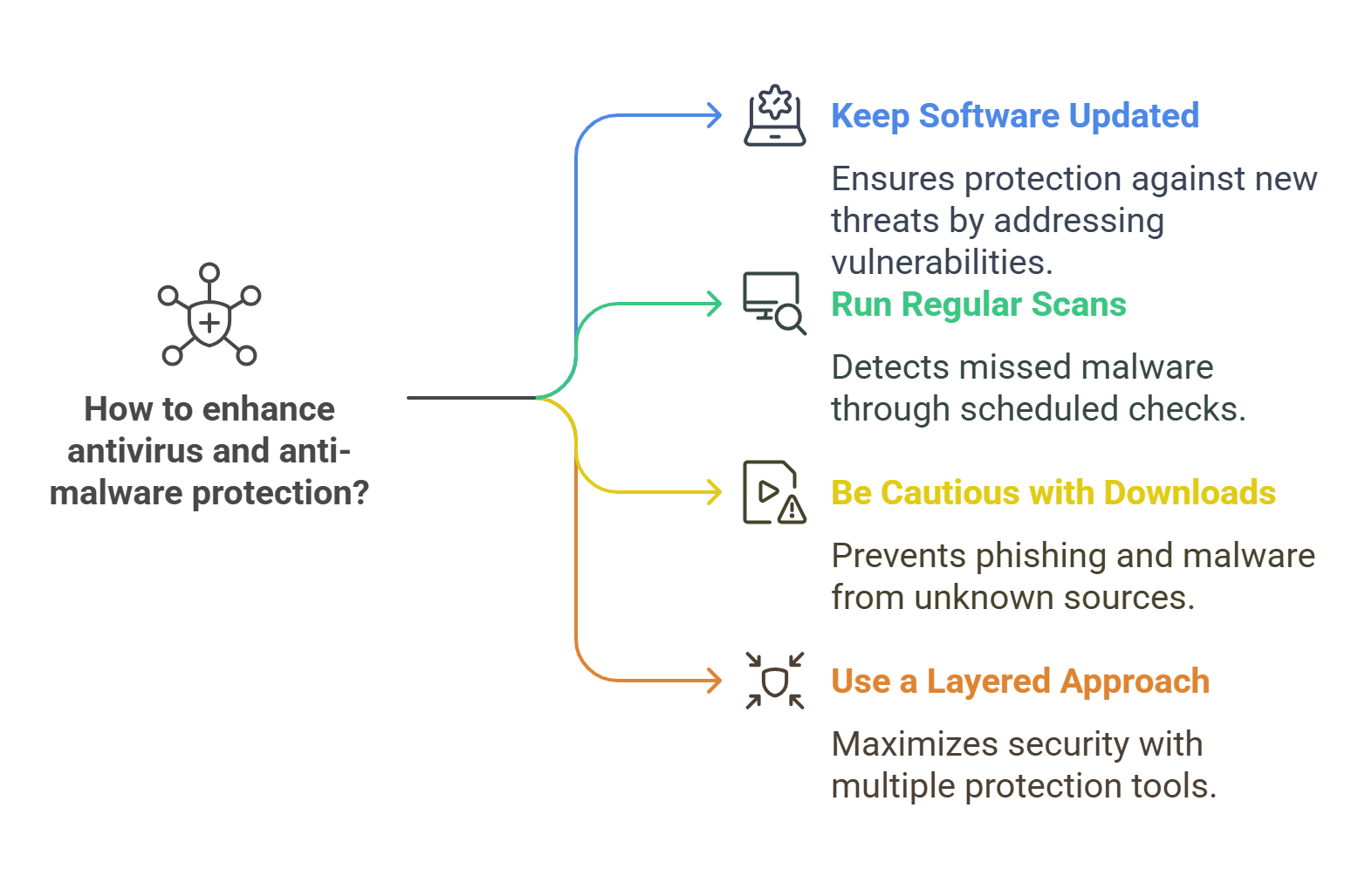
Common Myths About Antivirus and Anti-Malware Protection
Myth 1: “Antivirus Software Is Enough to Protect Me.”
Antivirus software is important, but it’s not a complete solution. As new threats arise, antivirus software alone may not offer full protection. Anti-malware software is also needed to provide complete defense.
Myth 2: “I Don’t Need Antivirus Software If I’m Careful Online.”
Even the most cautious online users can still fall victim to cyberattacks. Cybercriminals are always finding new ways to bypass security, so antivirus and anti-malware protection are necessary for everyone.
Myth 3: “Free Antivirus Software Is Just As Good As Paid Options.”
Free antivirus software might provide basic protection, but it often lacks features needed to protect against more advanced threats. Paid software usually offers better protection and more reliable customer support.
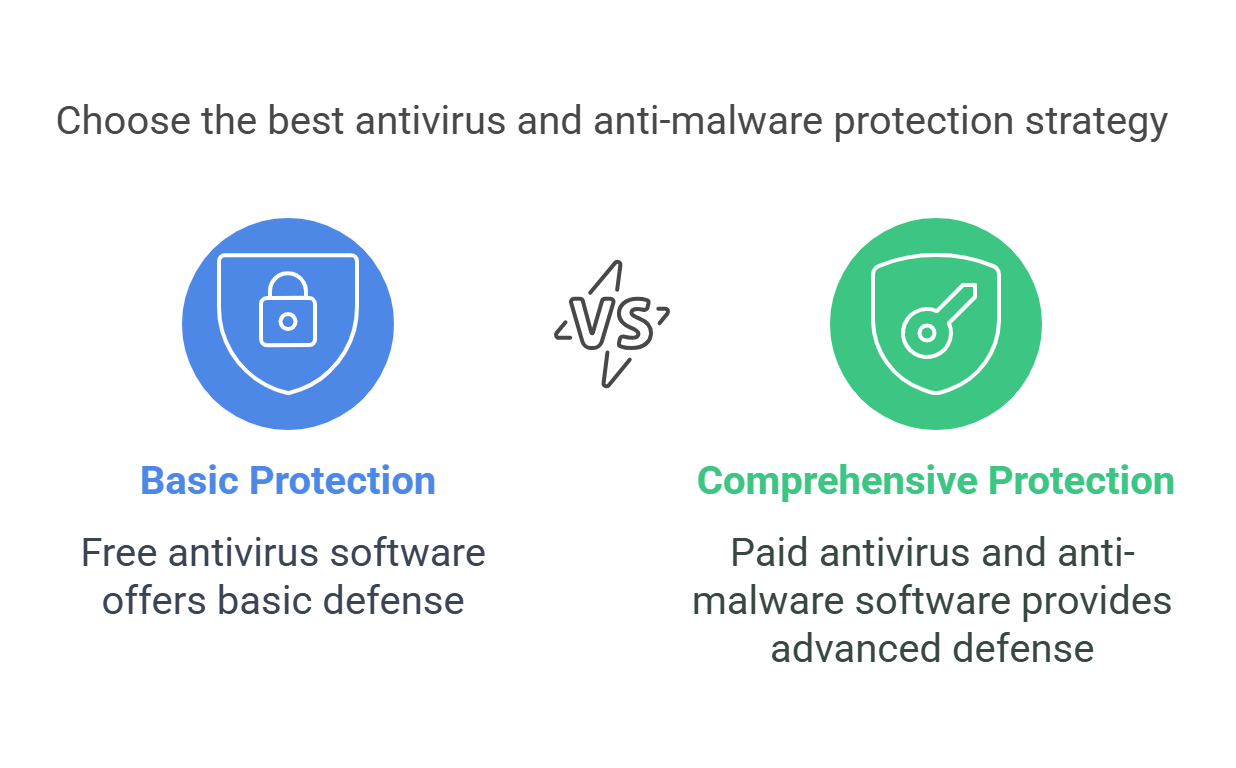
Frequently Asked Questions (FAQs)
1. Do I need both antivirus and anti-malware software?
Yes, using both ensures you are protected from a wide range of threats, including viruses, spyware, ransomware, and more.
2. Can antivirus software remove malware?
Most antivirus software can remove malware, but for more complex threats like ransomware or rootkits, you may need a separate anti-malware tool.
3. Is it safe to use free antivirus software?
Free antivirus software can offer basic protection but may lack important features like real-time scanning or automatic updates. Paid versions often provide better protection and support.
4. How often should I update my antivirus software?
Always enable automatic updates to ensure your software stays current and is ready to detect the latest threats.
5. Can antivirus software protect me from phishing?
Antivirus software can help detect some phishing attempts, but it’s also important to be cautious when clicking on links or downloading attachments.
Conclusion: Protect Yourself with the Best Antivirus and Anti-Malware Software
As cyber threats continue to grow, antivirus and anti-malware software are essential. By investing in reliable protection and keeping your software updated, you can reduce the risk of falling victim to cyberattacks. Whether you’re worried about viruses, ransomware, or data theft, antivirus and anti-malware software will help keep you safe.
Take action now to protect your devices and personal data. Don’t wait for an attack—choose a trusted antivirus and anti-malware solution to safeguard yourself from online threats.

